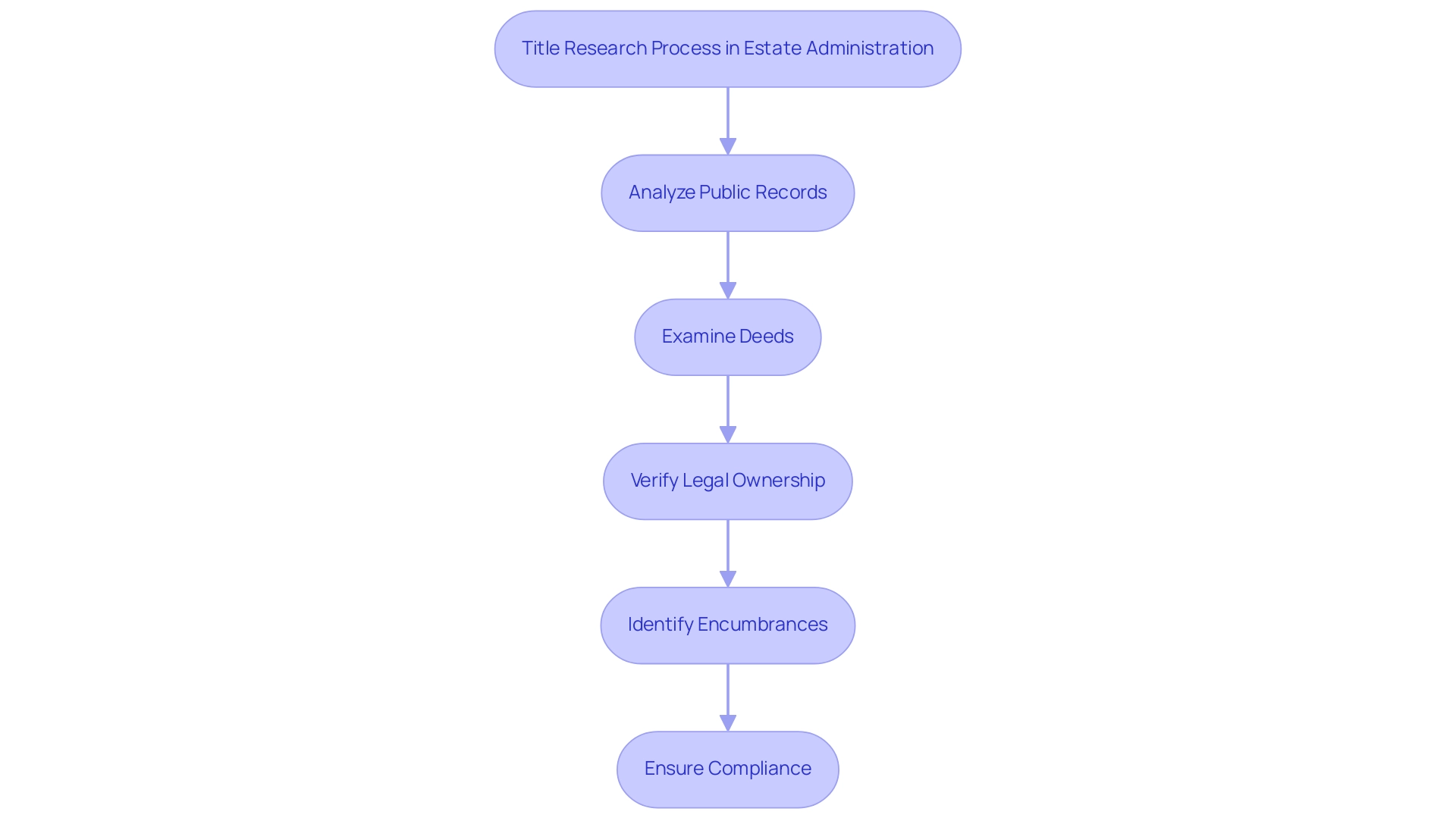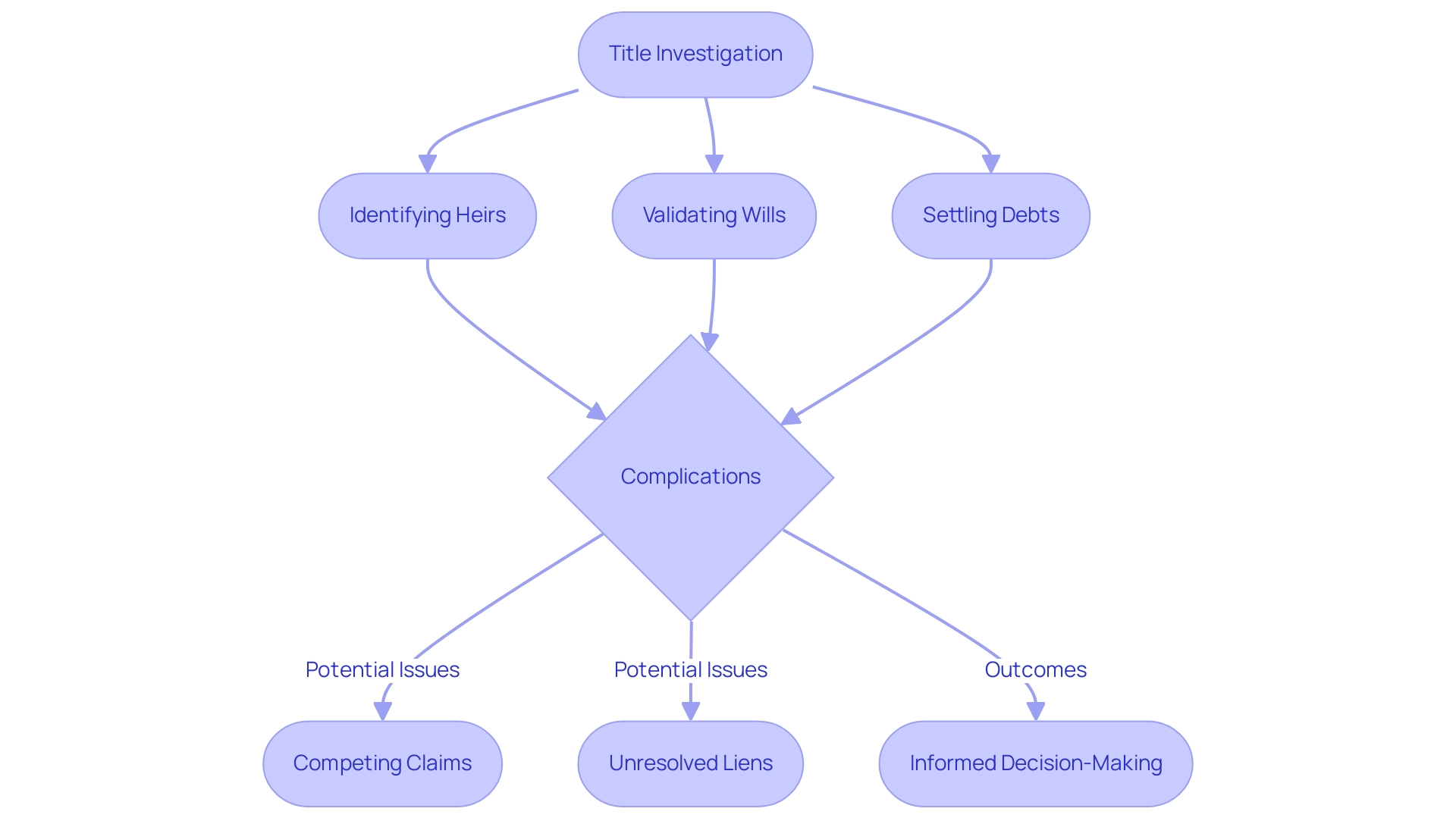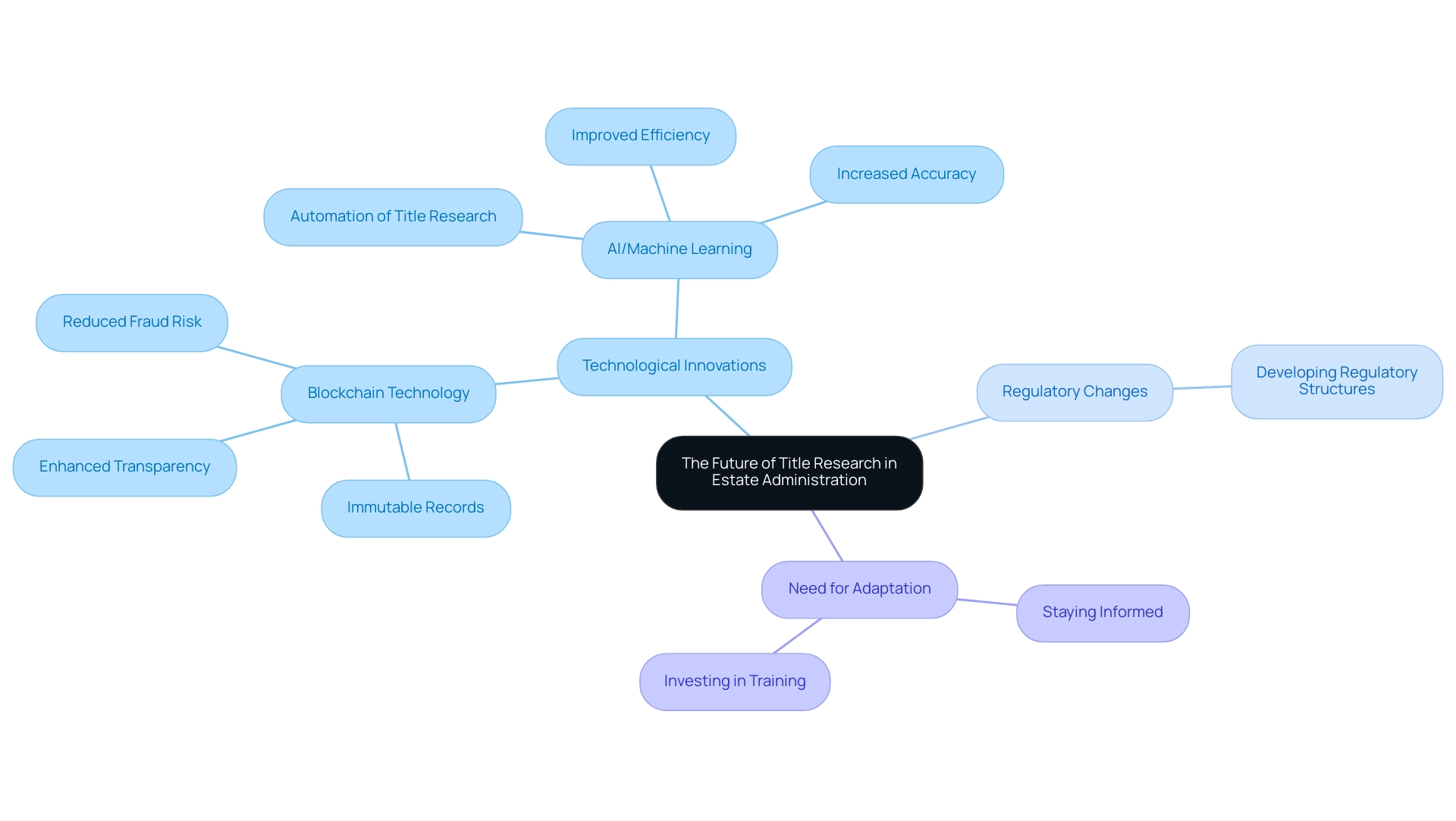Introduction
In the intricate landscape of estate administration, title research emerges as a foundational element that ensures the legal integrity of property ownership. This essential process involves thorough examinations of public records, deeds, and various legal documents to ascertain clear title and uncover any encumbrances that may affect the estate's assets. As estate administrators navigate the complexities of probate and asset management, a comprehensive understanding of title research becomes paramount.
By identifying potential issues such as competing claims or unresolved liens, administrators can facilitate smoother transitions for heirs and uphold the decedent's wishes. Moreover, advancements in technology are revolutionizing this field, enhancing the efficiency and accuracy of title research, and equipping professionals with the tools necessary to adapt to an evolving regulatory landscape.
Defining Title Research and Its Importance in Estate Administration
Title investigation is the procedure of analyzing and confirming the legal ownership of real assets, which is crucial in asset management. This process entails examining public records, deeds, and other legal documents to establish clear ownership and identify any encumbrances, such as liens or claims against the asset.
In the framework of property management, ownership investigation is essential for guaranteeing that assets are properly evaluated and allocated based on the decedent's intentions. A thorough title search mitigates risks associated with disputes over ownership and helps to ensure compliance with legal requirements, thereby facilitating smoother transactions and transfers of assets.

Navigating Complexities: The Role of Title Research in Probate and Asset Management
Title investigation plays a crucial role in probate and asset management by clarifying the ownership status of properties included in a succession. The probate process often involves:
- Identifying heirs
- Validating wills
- Ensuring that all debts and claims against the property are settled before assets can be distributed
Title investigation helps to identify potential issues that may arise during this process, such as:
- Competing claims
- Unresolved liens
These issues can complicate asset management. By offering a clear understanding of property ownership, estate administrators can:
- Make informed decisions
- Facilitate smoother transitions for heirs
- Uphold the legal integrity of the estate
Furthermore, utilizing advanced technologies, like AI-driven software for information gathering, further improves the efficiency and precision of this crucial process, ensuring that all pertinent details are easily accessible for effective decision-making.

The Process of Conducting Title Research
Conducting ownership research is a meticulous process that encompasses several essential steps. Initially, the researcher must accurately identify the asset, gathering fundamental details such as the address and parcel number. Following this, access to public records is essential; this includes land registries, tax assessments, and historical deeds, which are crucial for tracing the chain of ownership.
For example, documents like tax records and earlier deed papers are frequently utilized in ownership investigation to determine ownership background. Researchers frequently work together with local municipalities or ownership firms to obtain supplementary information, ensuring a comprehensive understanding of the property’s history. Recent statistics show that over 70% of document analysis is performed using digital public records, emphasizing the significance of technology in this area.
Once all pertinent data is collected, a thorough analysis is conducted to identify any discrepancies or issues that could potentially impact ownership rights. A notable case study is the Burlington School District, which faced allegations of sex discrimination related to peer-on-peer harassment. This situation highlights the significance of precise research in identifying property-related issues that could have legal ramifications.
The culmination of this process is a detailed report that encapsulates the findings and highlights any encumbrances or claims related to the asset. This organized approach not only provides administrators with a clear legal status of the asset but also reduces risks linked to title problems.
Common Challenges in Title Research and How to Overcome Them
Title research can present several challenges, including:
- Incomplete records
- Conflicting claims
- Variations in property descriptions across different documents
To overcome these issues, estate administrators should adopt a proactive approach by:
- Utilizing multiple sources of information
- Engaging with experienced professionals when necessary
For example, if discrepancies occur, consulting with a real estate attorney can provide clarity and legal guidance. Additionally, employing advanced technologies, such as GIS mapping and AI tools, can streamline the investigation process and enhance accuracy by visualizing property boundaries and ownership histories. By anticipating these challenges and employing strategic solutions, property managers can effectively handle the intricacies of ownership verification.
The Future of Title Research in Estate Administration
The future of property examination in estate management is ready for change through technological innovations and developing regulatory structures. Innovations such as blockchain technology hold the potential to create immutable records of property ownership, enhancing transparency and reducing the risk of fraud. Additionally, the integration of artificial intelligence and machine learning can automate many aspects of title research, improving efficiency and accuracy.
As these technologies continue to develop, estate administrators will need to adapt their practices to leverage these tools effectively. Staying informed about emerging trends and investing in training will be crucial for professionals in the field, ensuring that they remain competitive and capable of providing high-quality services in an increasingly complex environment.

Conclusion
Title research is an indispensable component of estate administration, underpinning the legal frameworks that govern property ownership. By meticulously examining public records and legal documents, estate administrators can establish clear titles, identify encumbrances, and mitigate potential disputes. This thoroughness is essential not only for compliance with legal requirements but also for honoring the decedent's wishes and facilitating smooth transitions for heirs.
Navigating the complexities of probate and asset management is significantly enhanced by the insights gained through title research. It enables administrators to identify potential issues, such as competing claims or unresolved liens, thereby fostering informed decision-making and effective asset distribution. The integration of advanced technologies further streamlines this process, allowing for greater efficiency and accuracy in identifying property ownership and history.
Despite the challenges that may arise, such as incomplete records or conflicting claims, proactive strategies can be employed to overcome these obstacles. Engaging experienced professionals and utilizing innovative tools enhances the reliability of title research outcomes. As the landscape of estate administration continues to evolve, the future of title research promises to be shaped by technological advancements, ensuring that estate administrators are well-equipped to meet the demands of a changing regulatory environment.
In summary, the importance of title research in estate administration cannot be overstated. It serves as the foundation for establishing property rights, facilitating compliance, and ensuring the equitable distribution of assets. As the field continues to advance, staying abreast of emerging technologies and best practices will remain critical for professionals dedicated to upholding the integrity of estate management.
Frequently Asked Questions
What is title investigation?
Title investigation is the procedure of analyzing and confirming the legal ownership of real assets by examining public records, deeds, and other legal documents to establish clear ownership and identify any encumbrances, such as liens or claims against the asset.
Why is title investigation important in asset management?
Title investigation is crucial in asset management because it ensures that assets are properly evaluated and allocated according to the decedent's intentions, mitigates risks associated with disputes over ownership, and helps ensure compliance with legal requirements, facilitating smoother transactions and transfers of assets.
How does title investigation relate to the probate process?
Title investigation clarifies the ownership status of properties involved in a succession during the probate process, which includes identifying heirs, validating wills, and ensuring all debts and claims against the property are settled before asset distribution.
What potential issues can arise during the probate process that title investigation can help identify?
Potential issues include competing claims and unresolved liens, which can complicate asset management.
What steps are involved in conducting ownership research?
Ownership research involves accurately identifying the asset, gathering details such as the address and parcel number, accessing public records like land registries and tax assessments, and analyzing the collected data to identify discrepancies or issues impacting ownership rights.
How has technology impacted title investigation?
Technology, particularly digital public records, has significantly improved the efficiency and precision of title investigation, with over 70% of document analysis now performed using digital tools. Advanced technologies like AI-driven software and GIS mapping enhance the investigation process by providing easy access to pertinent details.
What challenges can arise during title research?
Challenges in title research can include incomplete records, conflicting claims, and variations in property descriptions across different documents.
How can estate administrators overcome challenges in title research?
Estate administrators can overcome challenges by utilizing multiple sources of information, engaging with experienced professionals when necessary, and employing advanced technologies to streamline the investigation process and enhance accuracy.
What is the future of title research in estate management?
The future of title research is expected to be influenced by technological innovations such as blockchain technology, which can create immutable property ownership records, and the integration of AI and machine learning to automate aspects of title research, improving efficiency and accuracy. Estate administrators will need to adapt their practices to leverage these advancements effectively.
List of Sources
- The Process of Conducting Title Research
- Public Records: What You Need to Know | LexisNexis (https://lexisnexis.com/en-us/professional/research/glossary/public-records.page?srsltid=AfmBOoqkrbHZID6r8X6YVS6X5R0rdLA_3ygphsXmzoDGwmL6fUqjEPmC)
- justice.gov (https://justice.gov/crt/case-summaries)




